When I was pursuing my graduate degree on the Civil War and was nearing its completion, one professor posed a most interesting question to my class. He asked us if our studies had changed our views on warfare and, if so, to describe those changes. What lessons, he asked, had we learned that were still applicable today. At the time, I found this a very intriguing exercise and I still do. I was looking over my notes on the subject today and discovered that, despite all I have gone on to learn since those academic studies, my conclusion are the same and, if possible, I feel even stronger about them. My course of study changed the way in which I viewed warfare both by reinforcing some long held opinions while opening my eyes to other possibilities. Among those, there were, however, a few particular areas in which my study of the Civil War was especially influential.
First, there is the influential role that a few key individuals can play in the outcome of a war. While it is generally accepted that wars are the undertakings of entire societies, entire cultures, and entire nations, it is still remarkable how much influence certain individuals can have in shaping its course and outcome. In doing so, it is not just a matter of their position; it is a matter of individual personalities and character. In looking at the Civil War, we can readily see the role played by Lincoln, Davis, Grant, and Lee simply by the positions they held. But, it is only by studying these men and their experiences that we see how they, as individuals, made a difference, for good or bad, in the war’s eventual outcome.
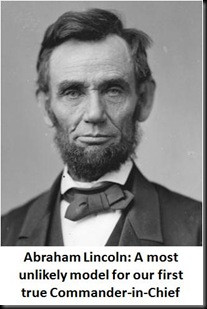 Abraham Lincoln is the most unlikely of men to have been an effective Commander-in-Chief. While he had no military training or background, he had everything else one could want in a wartime political leader. He had a single-minded sense of determination and a dedication to the nation’s cause that was unequaled. More than that, he possessed a marvelously multidimensional mind that gave him vision and the ability to learn. By painful trial and error, he would come to see not only how to achieve his goal of restoring the Union, but also how to operate with his senior military commander as an effective Commander-in-Chief. He also would articulate his nation’s war aims clearly and, thereby, enable his military leadership to eventually fight the war to achieve those aims. Finally, he would see war as a hard and terrible thing, but one necessary to save the world’s best, last hope for freedom.
Abraham Lincoln is the most unlikely of men to have been an effective Commander-in-Chief. While he had no military training or background, he had everything else one could want in a wartime political leader. He had a single-minded sense of determination and a dedication to the nation’s cause that was unequaled. More than that, he possessed a marvelously multidimensional mind that gave him vision and the ability to learn. By painful trial and error, he would come to see not only how to achieve his goal of restoring the Union, but also how to operate with his senior military commander as an effective Commander-in-Chief. He also would articulate his nation’s war aims clearly and, thereby, enable his military leadership to eventually fight the war to achieve those aims. Finally, he would see war as a hard and terrible thing, but one necessary to save the world’s best, last hope for freedom.
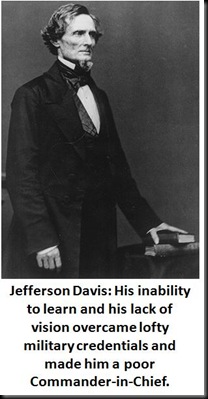 Jefferson Davis, on the other hand, had all the training and experience one could possibly want in a Commander-in-Chief. A graduate of West Point, a veteran of the Mexican War, and a former Secretary of War, Davis seems the ideal candidate to be a highly effective wartime Commander-in-Chief. Further, he was a man of intense dedication to his cause and it can be truthfully stated that no man worked harder to see that cause through. But, at the same time, Davis was stiff and unbending in his opinions. He had little vision, either political or strategic. Where Lincoln ably developed and articulated his nation’s war aims, Davis is virtually mute on that point. Worse, Davis was man who seemed unable or unwilling to learn from his mistakes. As a result, Southern strategy was stagnant and untenable, and Davis was a most ineffective Commander-in-Chief.
Jefferson Davis, on the other hand, had all the training and experience one could possibly want in a Commander-in-Chief. A graduate of West Point, a veteran of the Mexican War, and a former Secretary of War, Davis seems the ideal candidate to be a highly effective wartime Commander-in-Chief. Further, he was a man of intense dedication to his cause and it can be truthfully stated that no man worked harder to see that cause through. But, at the same time, Davis was stiff and unbending in his opinions. He had little vision, either political or strategic. Where Lincoln ably developed and articulated his nation’s war aims, Davis is virtually mute on that point. Worse, Davis was man who seemed unable or unwilling to learn from his mistakes. As a result, Southern strategy was stagnant and untenable, and Davis was a most ineffective Commander-in-Chief.
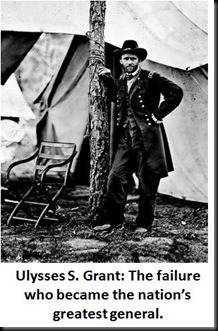 Ulysses Grant, meanwhile, was a man whose life seemed marked by failure. But, in war, he would prove himself. Not an intellectual or a learned strategist, Grant was a simple man who possessed remarkable common sense and an extraordinary ability to both recognize and execute a calculated risk. Like Lincoln, he had a profound ability to learn from both success and error, and, more importantly, to apply what he learned in an effective manner. He also had a strong sense of professionalism that allowed him to overlook matters of personal ego and, instead, dedicate himself to the task of his nation. He understood the role of a military commander, its responsibilities, and, most importantly, his place in relationship to his Commander-in-Chief. As such, he was a partner with Lincoln in winning the war and creating the military command structure which serves as the basis for the one employed to this day.
Ulysses Grant, meanwhile, was a man whose life seemed marked by failure. But, in war, he would prove himself. Not an intellectual or a learned strategist, Grant was a simple man who possessed remarkable common sense and an extraordinary ability to both recognize and execute a calculated risk. Like Lincoln, he had a profound ability to learn from both success and error, and, more importantly, to apply what he learned in an effective manner. He also had a strong sense of professionalism that allowed him to overlook matters of personal ego and, instead, dedicate himself to the task of his nation. He understood the role of a military commander, its responsibilities, and, most importantly, his place in relationship to his Commander-in-Chief. As such, he was a partner with Lincoln in winning the war and creating the military command structure which serves as the basis for the one employed to this day.
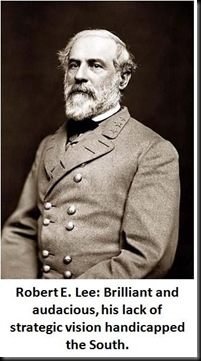 Finally, there is Robert E. Lee, the soldierly gentleman from Virginia. He too was man of great character, determination, and dedication. At times, it was his strength of will alone that seems to have held the Army of Northern Virginia together. He was a masterful tactician at times and, like Grant, he could seize the initiative with a gifted sense of the calculated risk. But, at the same time, he hated personal conflict and, as a result, could not bring himself to discipline his key commanders when it was necessary to do so. He also had less ability to analyze and learn from his mistakes, especially in the strategic sense. While he seems to have understood the South’s tenuous overall strategic and political position, he apparently did not possess the strategic vision to see beyond his own theater and his army. As a result, when Lee’s Commander-in-Chief needed strategic advice, he received the narrow views of a man who could see no farther than the Eastern Theater and the Army of Northern Virginia.
Finally, there is Robert E. Lee, the soldierly gentleman from Virginia. He too was man of great character, determination, and dedication. At times, it was his strength of will alone that seems to have held the Army of Northern Virginia together. He was a masterful tactician at times and, like Grant, he could seize the initiative with a gifted sense of the calculated risk. But, at the same time, he hated personal conflict and, as a result, could not bring himself to discipline his key commanders when it was necessary to do so. He also had less ability to analyze and learn from his mistakes, especially in the strategic sense. While he seems to have understood the South’s tenuous overall strategic and political position, he apparently did not possess the strategic vision to see beyond his own theater and his army. As a result, when Lee’s Commander-in-Chief needed strategic advice, he received the narrow views of a man who could see no farther than the Eastern Theater and the Army of Northern Virginia.
These four men are pronounced studies in how personality can influence events. Had any one of them been different, the future of an entire nation might have changed. But, my studies also showed me how important events in a war can also turn on individuals of lesser position, men on the line in tactical situations. Typically, they are facing what, in terms of the entire war, is only a single, isolated moment. The situation is often fluid, crisis is imminent, and only their action will make a difference. In this category of individual, there are numerous examples. 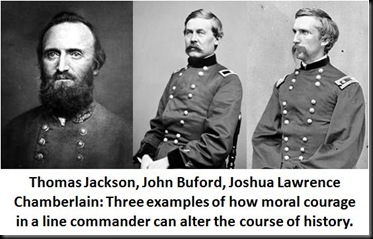 There is Thomas “Stone wall” Jackson at First Manassas, standing for all to see, holding the line when others were running. Then, there is John Buford, deciding to hold and fight a defense in depth on the ridges west of Gettysburg, and Joshua Lawrence Chamberlain, stubbornly refusing to abandon his position on Little Round Top. There are hundreds more examples and this war, as well as any war, is full of these kinds of moments and the men who find themselves facing fate head-on. Some of them are up to the task, possessing that special brand of moral courage that comes to the forefront in a crisis, while many more are found wanting. In either case, entire battles turn upon them and, with them, can go the fates of nations.
There is Thomas “Stone wall” Jackson at First Manassas, standing for all to see, holding the line when others were running. Then, there is John Buford, deciding to hold and fight a defense in depth on the ridges west of Gettysburg, and Joshua Lawrence Chamberlain, stubbornly refusing to abandon his position on Little Round Top. There are hundreds more examples and this war, as well as any war, is full of these kinds of moments and the men who find themselves facing fate head-on. Some of them are up to the task, possessing that special brand of moral courage that comes to the forefront in a crisis, while many more are found wanting. In either case, entire battles turn upon them and, with them, can go the fates of nations.
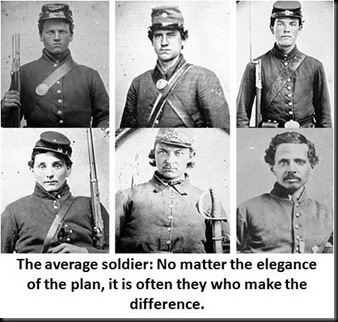 The other thing I learned in studying the Civil War is to never doubt the determination of the average soldier. No matter how good or bad a general’s plan might be, they have the ability make a difference. So many engagements in the Civil War were part of an elegant tactical plan, but, once the shooting started, they rapidly turned into a “solder’s fight” where men simply fought tenaciously because they were there, with no rhyme or reason nor an understanding of why they were there. How well they fought would often determine the outcome, not the plan that they were a part of that day. This war also teaches us that men do, indeed, fight for the comrades around them, but they also will fight for a cause. A study of Civil War’s soldiers shows them to have been men with well-developed personal views on the war and the particular cause they were fighting for. Armed with a dual motivation of comrade and cause, a soldier will overcome great odds, and prevail over the harshness of their daily existence, separation from home and family, and the despair of ever-present death and disease. In the end, they will sacrifice everything if needed. But, these men still have their limits. To overcome such odds, they must believe in the men who lead them as much as the men around them and the cause they are defending. They must believe that the man who leads them, who holds ultimate command, will not sacrifice them needlessly and, above all, can bring them victory. In essence, they require and demand nothing less than what they are offering themselves.
The other thing I learned in studying the Civil War is to never doubt the determination of the average soldier. No matter how good or bad a general’s plan might be, they have the ability make a difference. So many engagements in the Civil War were part of an elegant tactical plan, but, once the shooting started, they rapidly turned into a “solder’s fight” where men simply fought tenaciously because they were there, with no rhyme or reason nor an understanding of why they were there. How well they fought would often determine the outcome, not the plan that they were a part of that day. This war also teaches us that men do, indeed, fight for the comrades around them, but they also will fight for a cause. A study of Civil War’s soldiers shows them to have been men with well-developed personal views on the war and the particular cause they were fighting for. Armed with a dual motivation of comrade and cause, a soldier will overcome great odds, and prevail over the harshness of their daily existence, separation from home and family, and the despair of ever-present death and disease. In the end, they will sacrifice everything if needed. But, these men still have their limits. To overcome such odds, they must believe in the men who lead them as much as the men around them and the cause they are defending. They must believe that the man who leads them, who holds ultimate command, will not sacrifice them needlessly and, above all, can bring them victory. In essence, they require and demand nothing less than what they are offering themselves.
These few lessons are excellent examples of why, even after 145 years, the Civil War continues to function as an excellent classroom for those who study the art and science of warfare. It is worthy of our study and our understanding for so many reasons. So, whenever you pick up a book on the subject, open your mind, look beyond just the words on the page in front of you, and you will see all that there is to learn.





